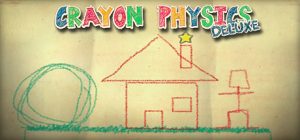993rd played so far
Genre: Puzzle
Platform: PC
Year of Release: 2009
Developer: Petri Purho
There’s this fun little genre of puzzle games that consists of small Rube Goldberg setups, where you add some bits and pieces to a level to reach your goal – often bringing one thing to another. The Incredible Machine and Armadillo Run do this through adding objects, while Crayon Physics Deluxe seems to take its cue from Max and the Magic Marker and lets you draw them instead. It feels more limiting, but looking at it the game seems to have plenty of puzzles to keep you going.
Our Thoughts
The core of Crayon Physics Deluxe is quite simple. You can draw objects that’ll help guide a ball to all the stars in a level, either giving it a surface to move on, a wall to stop it or some other solution. It’s pretty open in how you do it, as long as you reach the goal you get your basic point. It builds up from there, where elegant and awesome solutions get you bonus points, while being efficient in your solution does the same. It’s a neat trick to let you progress (I think you only need the basics to keep advancing through most of the areas) but get rewards for thinking further.
The aesthetics do amazing at adding to that. They are all crayon drawings, from the levels to the world map to other art, and it’s a charming and lovely idea. It’s incredibly consistent throughout the game and really creates that feeling of fun while retaining the simplicity you see in the game itself.
Then as you progress to later islands, the game starts introducing additional items – pivots swing around, for example, and ropes that you can use in pulley systems. They all come from the same idea quite nicely and never get too complex, a nice idea on its own.
Final Thoughts
Crayon Physics Deluxe does exactly what a puzzle game needs to do: It takes a concept, lets you play with it, and slowly builds on it until you’re surprisingly complex puzzles. It’s a nice idea and works well in its execution.

[…] to that, it feels like puzzle games are also a good way to explore new concepts by indie devs. Crayon Physics Deluxe and Grow, for example, aren’t big projects, but they are incredibly engaging games that I […]